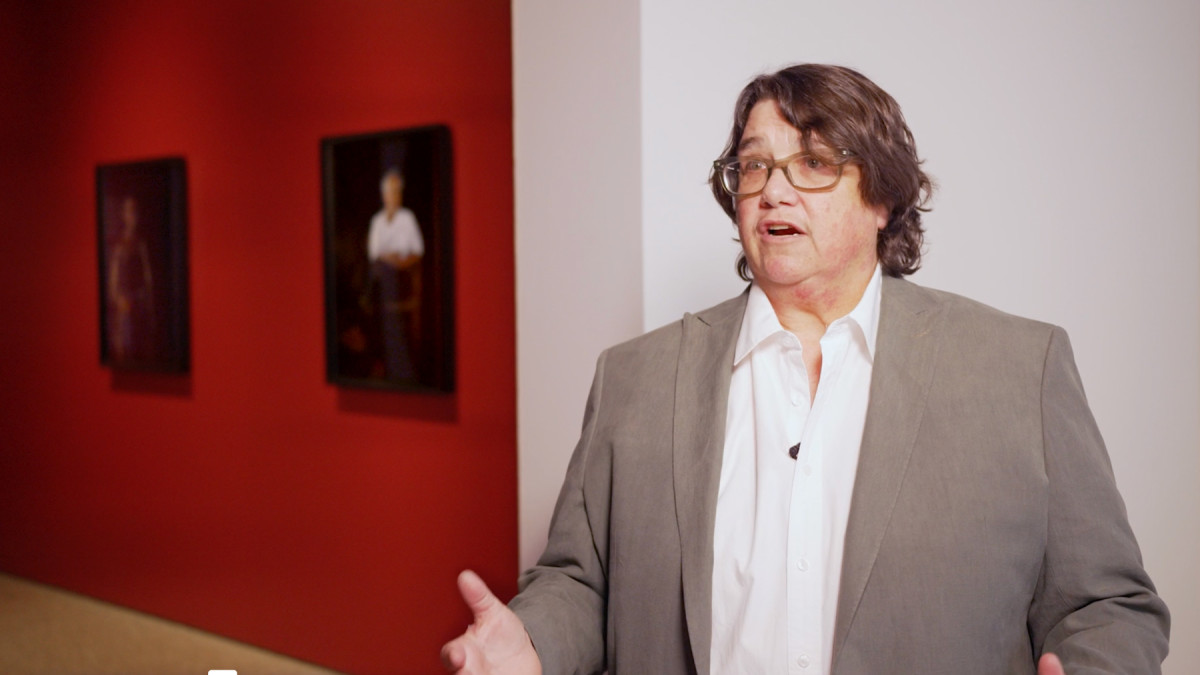Angela (crotch grab)
1992 - Photography (Photography)
Catherine Opie
Since the 1990s, Catherine Opie has been recognized for her use of documentary photography to address issues of community and queerness, and the ways in which identity is shaped by architecture. Particularly resonant during the Culture Wars of the 1980s and early 1990s—a time in which the religious right tried to impose itself as a political force and cultural censor—Opie’s photographs privilege the representation of specific communities, whether the LGBT, teenagers, surfers, football players, or her group of friends who engage in sexual role playing, tattooing, and piercing.
Colors:
Other related works, blended automatically

© » ROYAL ACADEMY
Catherine Opie
Video: Catherine Opie on photographing leading British artists | Blog | Royal Academy of Arts Catherine Opie in the RA Collection Gallery Video: Catherine Opie on photographing leading British artists Read more Become a Friend Video: Catherine Opie on photographing leading British artists Published 8 September 2023 Catherine Opie discusses her portraits of David Hockney, Anish Kapoor, Gillian Wearing, Isaac Julien and Lynette Yiadom-Boakye, featured in our free display in the Collection Gallery...

© » KADIST
Walead Beshty
2012Constructed out of metal or glass to mirror the size of FedEx shipping boxes, and to fit securely inside, Walead Beshty’s FedEx works are then shipped, accruing cracks, chips, scrapes, and bruises along the way to their destination...

© » KADIST
Juliana Huxtable
2017Herculine’s Prophecy by Juliana Huxtable features a kneeling demon-figure on what appears to be a screen-print, placed on a wooden table, which has then been photographed and digitally altered to appear like a book cover, with a title and subtitle across the top, and a poem written across the bottom...

© » KADIST
Glenn Ligon
2000Glenn Ligon’s diptych, Condition Repor t is comprised of two side-by-side prints...

© » KADIST
Sharon Lockhart
2008Lockhart’s film Lunch Break investigates the present state of American labor, through a close look at the everyday life of the workers at the Bath Iron Works shipyard—a private sector of the U...

© » KADIST
James Welling
2006Welling employs simple materials like crumpled aluminum foil, wrinkled fabric and pastry dough and directly exposes them as photograms, playing with the image in the process of revealing it...

© » KADIST
Luisa Lambri
2007Rudolph Schindler’s designs, part of a practice he called “Space Architecture,” marry interior with exterior and space with light...

© » KADIST
Shahzia Sikander
2010The Last Post was inspired by Sikander’s ongoing interest in the colonial history of the sub-continent and the British opium trade with China...

© » KADIST
Gimhongsok
2007To explore the boundaries between artwork and audience, Gimhongsok created a series of sculptural performances in which a person wearing an animal costume poses in the gallery...

© » KADIST
Andrea Bowers
2010The small drawings that comprise Study from May Day March, Los Angeles 2010 (Immigration Reform Now) and We Are Immigrants Not Terrorists are based on photographs taken at a political rally in downtown Los Angeles in which thousands of individuals demonstrated for immigrants’ rights...

© » KADIST
John Baldessari
1997In One Must , an image of a pair of scissors, accompanied by the words of work’s title, poses an ominous question about the relationship between the image and the text...

© » KADIST
Doug Aitken
2009The version of Frontier acquired by the Kadist Collection consists of a single-channel video, adapted from the monumental installation and performance that Aitken presented in Rome, by the Tiber River, in 2009...

© » KADIST
Lynn Hershman Leeson
2007Lynn Hershman Leeson’s genre-bending documentary Strange Culture tells the story of how one man’s personal tragedy turns into persecution by a paranoid, conservative, and overzealous government...

© » KADIST
Andrea Bowers
2015Bowers’ Radical Hospitality (2015) is a sculptural contradiction: its red and blue neon letters proclaim the words of the title, signaling openness and generosity, while the barbed wires that encircle the words give another message entirely...

© » KADIST
Wolfgang Tillmans
2017Wolfgang Tillmans initiated the ongoing series Faltenwurf in 1989, representing compositions of unused clothing, with special attention paid to the ways in which they drape and fold...

© » KADIST
An-My LE
2010The print Patient Admission, US Naval Hospital Ship Mercy, Vietnam (2010) features an Asian Buddhist monk and an American Navy Solider on board the Mercy ship –one of the two dedicated hospital ships of the United States Navy– sitting upright in their chairs and adopting the same posture...

© » KADIST
Walead Beshty
2011Constructed out of metal or glass to mirror the size of FedEx shipping boxes, and to fit securely inside, Walead Beshty’s FedEx works are then shipped, accruing cracks, chips, scrapes, and bruises along the way to their destination...



